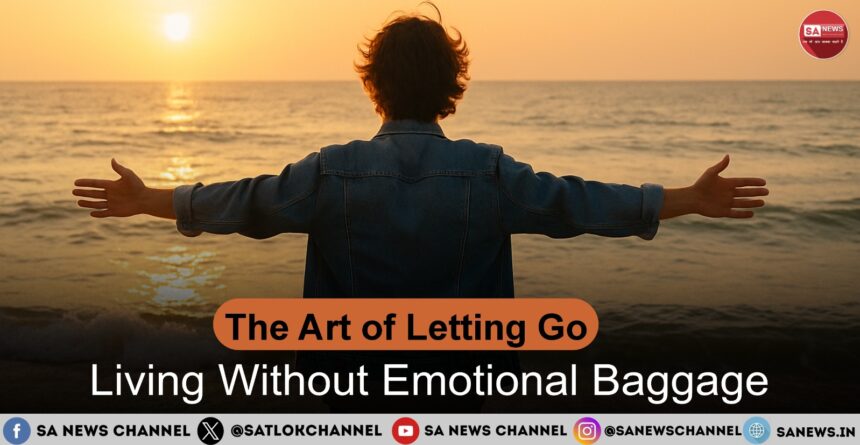Emotional baggage is something almost everyone carries-memories, disappointments, fears, or unresolved conflicts that silently influence how we think, behave, and connect with others. The art of letting go is not about forgetting the past; it is about freeing yourself from the weight that prevents you from living fully in the present. As modern life becomes more stressful and emotionally demanding, learning how to release this burden has become essential for mental clarity, emotional balance, and overall well-being.
- What Is Emotional Baggage?
- Why Letting Go Matters
- How to Let Go of Emotional Baggage
- 1. Acknowledge What You’re Carrying
- 2. Practice Mindful Acceptance
- 3. Reframe Negative Thoughts
- 4. Set Healthy Boundaries
- 5. Forgive-For Yourself, Not Others
- 6. Release the Need for Control
- 7. Seek Support When Needed
- Living a Life Free from Emotional Burden
- How Spiritual Wisdom Helps You Release Emotional Baggage
- FAQs on The Art of Letting Go
This article explores the psychology behind emotional baggage, why letting go matters, and the practical strategies you can use to live a lighter, happier, and more intentional life.
What Is Emotional Baggage?
Emotional baggage refers to unresolved emotional experiences that shape your current reactions, decisions, and relationships.
It can stem from:
- Past relationships
- Childhood trauma or difficult upbringing
- Failures, regrets, or disappointments
- Fear of rejection or abandonment
- Guilt, shame, or self-blame
It shows up in different ways-overthinking, jealousy, trust issues, fear of commitment, constant worry, or emotional burnout.
How Emotional Baggage Impacts Life
Carrying emotional baggage can lead to:
- Avoidance of opportunities or relationships
- Low self-esteem
- Repetitive unhealthy patterns
- Difficulty in trusting others
- Chronic stress, anxiety, or emotional overwhelm
Letting go doesn’t mean ignoring pain; it means choosing not to relive it repeatedly.
Why Letting Go Matters
Letting go is the foundation of emotional freedom. When you release unwanted emotions, you create space for healthier thoughts, stronger relationships, and a clearer sense of purpose.
Key Benefits of Letting Go
- Improved mental clarity: Overthinking reduces, allowing you to focus on what truly matters.
- Healthier relationships: With less fear and insecurity, communication becomes easier.
- Lower stress levels: Emotional release improves sleep and reduces anxiety.
- Higher self-esteem: You stop defining yourself by your past failures.
- Greater emotional resilience: You become more adaptable and confident.
Letting go is not a one-time act but a continuous practice that strengthens emotional intelligence.
How to Let Go of Emotional Baggage
Below are evidence-based and psychology-backed steps to release emotional burdens and build a healthier emotional life.
1. Acknowledge What You’re Carrying
Letting go begins with awareness. Many people avoid their emotions, hoping they’ll disappear on their own. Instead, observe:
- What triggers your emotional reactions
- Repetitive thoughts or fears
- Patterns in relationships or decision-making
- Memories that still feel painful
Honesty with yourself is the first step toward healing.
2. Practice Mindful Acceptance
Acceptance does not mean approval. It simply means acknowledging reality without resisting it.
Try mindfulness habits such as:
- Deep breathing
- Short meditation sessions
- Journaling your emotions
- Observing feelings without judgment
This helps separate your identity from your emotional experiences.
3. Reframe Negative Thoughts
A large part of emotional baggage is fueled by self-critical or fear-based thinking.
Using cognitive reframing, ask yourself:
- Is my fear based on facts or assumptions?
- What evidence supports my belief?
- How would I advise a friend in this situation?
Reframing helps you shift from emotional reactions to rational, balanced thinking.
4. Set Healthy Boundaries
Many people struggle with letting go because they lack boundaries-with work, relationships, or even themselves.
Healthy boundaries help:
- Protect emotional energy
- Prevent burnout
- Reduce resentment
- Build self-respect
Boundaries can include saying “no,” taking breaks, limiting toxic interactions, or prioritizing personal time.
5. Forgive-For Yourself, Not Others
Forgiveness is often misunderstood. It doesn’t justify what happened; it frees you from the emotional hold of past events.
You can forgive:
- Without reconciling
- Without forgetting
- Without allowing the same behavior again
Forgiveness is ultimately a gift you give yourself.
6. Release the Need for Control
Trying to control outcomes or people leads to tension and disappointment.
Letting go means embracing uncertainty and focusing on what you can influence-your thoughts, actions, and reactions.
Ask yourself:
- What aspects are beyond my control?
- What can I do right now that is healthy and productive?
Learning to detach reduces emotional strain and builds resilience.
7. Seek Support When Needed
Talking to a close friend, therapist, or support community can help process unresolved emotions.
Professional support can provide:
- Tools to manage trauma
- Techniques for emotional regulation
- A safe, unbiased space to express feelings
Healing is easier when you’re not doing it alone.
Living a Life Free from Emotional Burden
Letting go is not the end of your story-it’s the beginning of a lighter chapter. Once you release emotional baggage, you gain:
- More meaningful relationships
- A deeper understanding of yourself
- Peace of mind
- Resilience to face future challenges
You begin to respond instead of react. You create new patterns, make conscious choices, and reclaim the joy that emotional weight once overshadowed.
Also Read: A “Jobless Future” for India’s Middle Class | Rise of Gig Economy
How Spiritual Wisdom Helps You Release Emotional Baggage
Letting go of emotional baggage is not just a psychological process-it is a deeper journey toward inner freedom. While modern life teaches us to suppress pain or fight alone, Sant Rampal Ji Maharaj explains in His discourses that true release comes only when the soul connects with the Supreme Power through real devotion. His teachings reveal that many emotional burdens exist because we rely on our limited strength, carrying wounds, expectations, and fears without guidance.
By adopting the spiritual path He provides, one naturally experiences peace, detachment from past suffering, and the clarity to live with purpose. This blend of practical healing and divine wisdom empowers a person to rise above old patterns and embrace a lighter, more meaningful life-spiritually and emotionally.
FAQs on The Art of Letting Go
1. What does it mean to let go emotionally?
Letting go emotionally means releasing past hurts, fears, or regrets that affect your present. It involves accepting what happened, changing limiting beliefs, and choosing healthier emotional responses.
2. How do I know if I’m carrying emotional baggage?
You may be carrying emotional baggage if you overthink, avoid relationships, repeat negative patterns, feel triggered easily, or struggle to trust. These signs show unresolved emotions are influencing your behavior.
3. How can I let go of past hurt quickly?
Start by acknowledging your feelings, practicing mindfulness, reframing negative thoughts, and setting boundaries. Small steps like journaling, meditation, and talking to someone you trust help speed up emotional release.
4. Why is letting go important for mental health?
Letting go reduces stress, improves clarity, strengthens relationships, and prevents emotional burnout. It frees mental space so you can focus on healthier thoughts and present-moment living.









